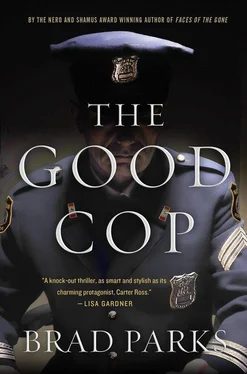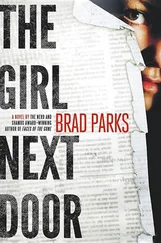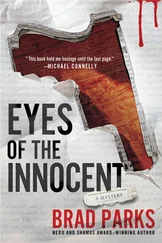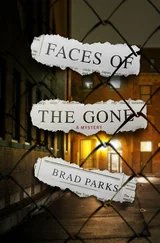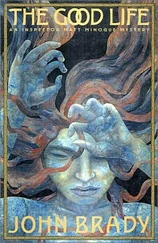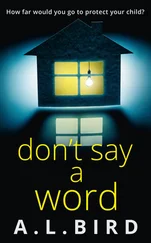Brad Parks - The Good Cop
Здесь есть возможность читать онлайн «Brad Parks - The Good Cop» весь текст электронной книги совершенно бесплатно (целиком полную версию без сокращений). В некоторых случаях можно слушать аудио, скачать через торрент в формате fb2 и присутствует краткое содержание. Год выпуска: 2013, ISBN: 2013, Издательство: Minotaur Books, Жанр: Триллер, на английском языке. Описание произведения, (предисловие) а так же отзывы посетителей доступны на портале библиотеки ЛибКат.
- Название:The Good Cop
- Автор:
- Издательство:Minotaur Books
- Жанр:
- Год:2013
- ISBN:9781250005526
- Рейтинг книги:3 / 5. Голосов: 1
-
Избранное:Добавить в избранное
- Отзывы:
-
Ваша оценка:
- 60
- 1
- 2
- 3
- 4
- 5
The Good Cop: краткое содержание, описание и аннотация
Предлагаем к чтению аннотацию, описание, краткое содержание или предисловие (зависит от того, что написал сам автор книги «The Good Cop»). Если вы не нашли необходимую информацию о книге — напишите в комментариях, мы постараемся отыскать её.
The Good Cop — читать онлайн бесплатно полную книгу (весь текст) целиком
Ниже представлен текст книги, разбитый по страницам. Система сохранения места последней прочитанной страницы, позволяет с удобством читать онлайн бесплатно книгу «The Good Cop», без необходимости каждый раз заново искать на чём Вы остановились. Поставьте закладку, и сможете в любой момент перейти на страницу, на которой закончили чтение.
Интервал:
Закладка:
He looked up and rewarded me with another scowl. “Toward that end, I would like to introduce Captain Denise Boswell. After a long and decorated career with the Newark Police Department, Captain Boswell was placed in command of the Fourth Precinct late last year, becoming the first female officer in Newark history to attain that level. Since she was the commanding officer to both Sergeant Kipps and Detective Fusco, we felt it was appropriate for her to make this difficult announcement. Captain Boswell?”
The room was quiet as Boswell approached the microphone. She had a sheet of white paper that had been folded into quarters, and the rustling as she unfolded it was amplified by the conference room’s sound system. Captain Boswell was not a tall woman, far shorter than the men who usually appeared at these things, and the variety of microphones that had been strapped to the podium-representing various local radio, television, and Internet outlets-had not been adjusted properly. She was practically lost behind them.
Her voice, however, was not. It was strong and confident as she began reading from her sheet of paper.
“This has been a tragic week in the City of Newark, with the loss of two of our finest officers, Darius Kipps and Michael Fusco. It has been particularly hard for those of us in the Fourth Precinct who had the privilege of working alongside these officers as they attended to their duties. And I would ask that we all keep the families of these officers in our prayers during this difficult time.”
She paused for a quick moment of solemnity, then pushed onward:
“As many of you are aware, the department announced a preliminary determination that Detective Sergeant Darius Kipps died of a self-inflicted gunshot wound. That will not be our final determination in this matter. And on behalf of the Newark Police Department, I would like to publicly apologize to the family of Darius Kipps for this error.”
My internal Surprise-o-meter was registering one of its highest possible readings. As a rule, police departments didn’t admit to botching anything, much less an investigation into the death of one of their own officers. Then Boswell pushed the Surpriseometer clear off the charts.
“Early this morning,” she said slowly, deliberately, “I received a call from Detective Fusco’s cell phone. During this call, he confessed to killing Detective Sergeant Kipps over a personal dispute and then to altering certain aspects of the crime scene to make it appear to be a suicide.”
She paused again, and some of the reporters actually squirmed in their seats. Professional decorum demanded that they not react in a demonstrable manner. But I knew that if this had been a movie they were watching at home, half of them would have been yelling at their television screens, “Whoa!”
Boswell continued her statement: “Detective Fusco informed me he could not live with himself as a result of this act but that he wanted to set the record straight. He then terminated the phone call. As we now know, it appears that placing that phone call was his last act before he turned his service weapon on himself and ended his own life.”
As soon as I heard the term “service weapon,” I felt a prickle from the base of my spine all the way up to my neck. In my head, I could hear the voice of tough guy Mike Fusco telling me about how he had been placed on administrative leave and lamenting, I even had to turn in my service weapon.
When had he told me that? Yesterday, when I came by with those photos of Kipps. Had he somehow gotten the gun back during the eighteen hours or so between when I last saw him and when he supposedly pulled its trigger? Did he have another department-issued gun that had simply been confused for his service weapon?
I didn’t know. But it was another inconsistency. That and the two shots that had been fired. I still didn’t know of any cop-or anyone who knew which end of a gun fired-who could miss his own head from six inches away.
Meanwhile, Captain Boswell was finishing up, “I’m sure many of you will have questions about how such a tragedy could have occurred and about whether it could have been prevented. We in the Newark Police Department are asking ourselves the same questions today. Unfortunately, we may not have many answers, as so much of this seemed to involve issues known only to these two officers.”
Boswell lifted her head for the first time, refolded her note, then stepped aside so Hakeem Rogers could take her place in front of the microphones.
“We will now take a limited number of questions,” he said. “Please wait for me to call on you.”
I immediately raised my hand in the air, but Rogers motioned to one of the television guys, who asked, “Captain Boswell, can you describe the nature of this personal dispute between these two officers?”
Boswell didn’t make a move toward the microphone. Instead, Rogers handled it: “That’s not something we’re going to be able to discuss. It was a personal dispute of a personal nature.”
A personal dispute of a personal nature. Well, that sure cleared things up. A reporter from one of the New York tabloids-who would probably be getting on the front page if he was able to discover this was the result of a sordid love triangle-got the next question. “Can you say how the crime scene was altered? Does this have something to do with the rope burns that were found on Officer Kipps?”
Good question from the Murdoch minion. I was expecting another dirty look from Rogers, but he was too busy conferring with Boswell. Eventually, he came back with “We don’t want to get into specifics. We’ll just say that as an officer who was well trained in our investigative techniques, he was able to use his insider knowledge to mislead us.”
There were several more queries from the press, none of which elicited anything in the way of new information. I had continued trying to get in my question about Fusco’s service weapon-as in, why did a suspended officer have one? — but Rogers had been ignoring me. I usually didn’t ask questions during these sorts of events. I tried to get the cops on the side, after the cameras stopped rolling, when they might be more likely to loosen up. But in this case I knew I wouldn’t get another chance. You only got that on-the-side time when the cops had something to brag about.
But even when there were no more hands being raised except mine, even when some of the other reporters were looking at me in the expectation I’d be called on, Rogers didn’t so much as glance in my direction. It was my punishment, obviously.
In some ways it was just as well. I doubted I was going to get a straight answer.
* * *
From the way everyone was packing up after the press conference-hastily, without much lingering or second thought-I could tell the assemblage of notebook holders and microphone monkeys were satisfied by what they had heard. Cop A personally kills Cop B over personal dispute of personal nature, becomes personally overwhelmed with guilt, turns gun on own person, end of personhood.
It was obvious the police director wanted this embarrassing story to become yesterday’s news as quickly as possible, so he offered up Captain Boswell, the most sympathetic emissary he could find, and had her tie up the whole sloppy mess with one neat little bow.
But I just wasn’t accepting the package. There were too many inconsistencies, too many things that didn’t fit into the narrative.
Did Fusco really call her moments before committing a two-bullet suicide? Maybe. Had Fusco somehow repossessed his own gun? Maybe. Had Fusco acted alone in killing Kipps and then been able to fool the entire Newark Police Department? Maybe.
There were just too many maybes. And, all the while, the roles of Mimi Kipps and Alvin LeRioux-who was up to his sanctimonious jowls in this somehow-were left undefined.
Читать дальшеИнтервал:
Закладка:
Похожие книги на «The Good Cop»
Представляем Вашему вниманию похожие книги на «The Good Cop» списком для выбора. Мы отобрали схожую по названию и смыслу литературу в надежде предоставить читателям больше вариантов отыскать новые, интересные, ещё непрочитанные произведения.
Обсуждение, отзывы о книге «The Good Cop» и просто собственные мнения читателей. Оставьте ваши комментарии, напишите, что Вы думаете о произведении, его смысле или главных героях. Укажите что конкретно понравилось, а что нет, и почему Вы так считаете.
